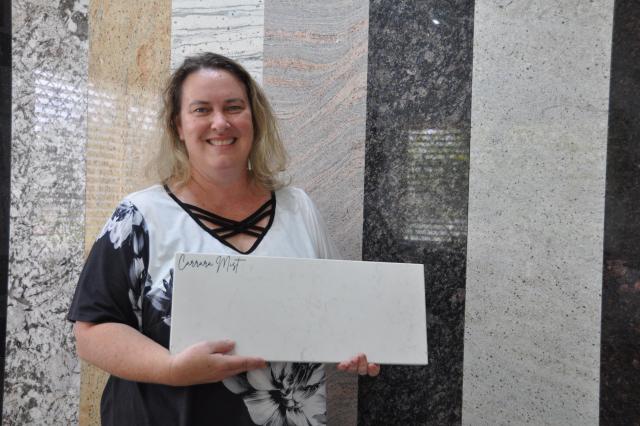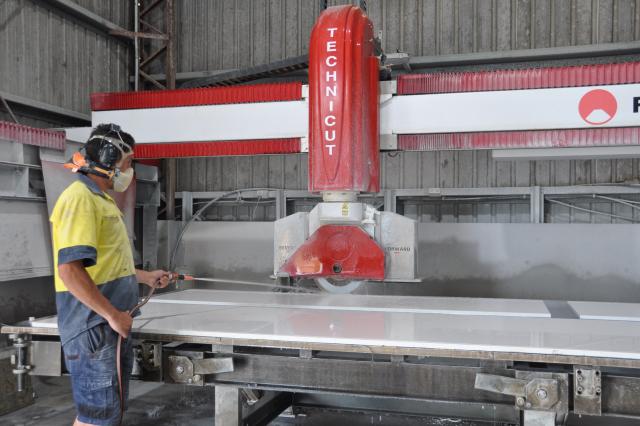With an estimated 600,000 workers said to be exposed to silica dust in Australian workplaces every year across all industries, this week’s announcement of the ban of engineered stone from 1 July 2024 is music to some ears but not all.
Ten Commandments Granite and Marble owner Robyn Booth said engineered stone makes up 90 per cent of her business and none of her staff have ever had a problem because they use it correctly.
“We have been trading in the industry since 2002 and all our staff have been checked and we have not had one case of silicosis or any other dust-related disease,” Robyn said.
“The product itself has changed dramatically over the years and as new technologies are found, the products continue to improve.
“The issue lies in the silica in the product. Once it was 90 per cent silica and now the product is down to 40 per cent and continues to improve.
“We also have many safety measures to adhere to when using the product which really makes the ban of the product a pointless exercise.
“We have had our staff wear dust monitors all day long and the dust picked up was so minimal it is not funny.
“Issues with engineered stone arose in the early days of the products use when it was being dry cut.
“We consistently water both the product and the work areas down, our team wear good quality masks and protective wear and we have never had a problem.
“We cannot change what has happened in the past.
“I should also reiterate to people who have engineered stone in their homes, it is perfectly safe. It is only when you cut the material that the silica dust comes out of the stone.”
Robyn said her business has dealt with six years of scare mongering and she believes it all comes back to the unions.
“To my knowledge there is not one stone mason in the unions and they have no right to stick their noses in anyone’s business,” she said.
“This will affect a lot of family businesses such as ours, not just the big companies.
“Fortunately, a number of companies have come up with a new product which they will roll out around March next year so we are hoping they are good products, time will tell.”
The Construction, Forestry, Maritime Employees Union (CFMEU) has hailed the full ban on engineered stone as a life-saving decision.
The CFMEU’s Stop This Killer Stone campaign called for a total ban on the import, manufacture and use of engineered stone.
The CFMEU’s campaign said they also had the support of retailers like Bunnings and IKEA, major construction and property companies like John Holland, Lendlease, Mirvac and Cubs Property, as well as the vast majority of Australians.
CFMEU National Secretary Zach Smith said Australia would be a safer place when the ban is implemented.
“This is an incredibly special day for Australian workers, especially every CFMEU member who fought for this life-saving change,” he said.
“This announcement is a massive victory for people like Kyle Goodwin, the former stonemason who bravely fronted our union’s campaign after contracting incurable silicosis from simply from doing his job.
“Kyle selflessly dedicated a huge chunk of his remaining days to stopping other workers from being given the same unthinkable diagnosis.
“Like Bernie Banton and asbestos, Kyle Goodwin’s name deserves to be inextricably linked to the ban on engineered stone.
“The CFMEU is ready to help governments implement the 1 July ban on the import, manufacture and use of engineered stone.”
National law firm Slater and Gordon also welcomed the national ban on engineered stone, resulting from discussions between State and Federal Governments, based on the Safe Work Australia report proposing the ban.
Slater and Gordon Head of National Asbestos and Dust Diseases, Joanne Wade said this is a monumental decision for Australian workers.
“This ban comes on the back of the union movement, to stop the importation, manufacturing and use of engineered stone in Australia.” Ms Wade said.
“There is no cure for silicosis and silica-related diseases, but they can be prevented. It has long been our firm’s position that workers will keep dying unless we ban engineered stone and stop the exposure to this deadly dust.
“In our legal practice, we have seen increasing cases of silica-related diseases arising often at the advanced and end stages, due to exposure to silica dust.
“We are also worried about the rate of undiagnosed silica-related injuries in workers and retired workers in industries where monitoring has not historically been imposed.
“Inhaling crystalline silica dust while cutting, grinding, polishing or drilling engineered stone used for kitchen or bathroom benches can lead to silicosis.
“However, crystalline silica is not just found in engineered stone benchtops, it is also found in quartz, sand, stone, soil, granite, brick, cement, grout, mortar, and bitumen.
“Industries that are exposed to silica dust include road works, tunnelling, stonemasonry, quarries, concreting, excavating, pottery, bricklaying, tiling and any other occupation that requires cutting or drilling into concrete (such as carpentry or plumbing).
“Not all of these industries have had compulsory health monitoring introduced. That is why, while we welcome the ban, we will continue to call for all workers exposed to silica dust to be given access to mandatory high-resolution CT chest scans and regular health screening.
“Despite the deplorable misinformation from manufacturers in response to calls for a national ban on engineered stone, the right decision has been made.”









